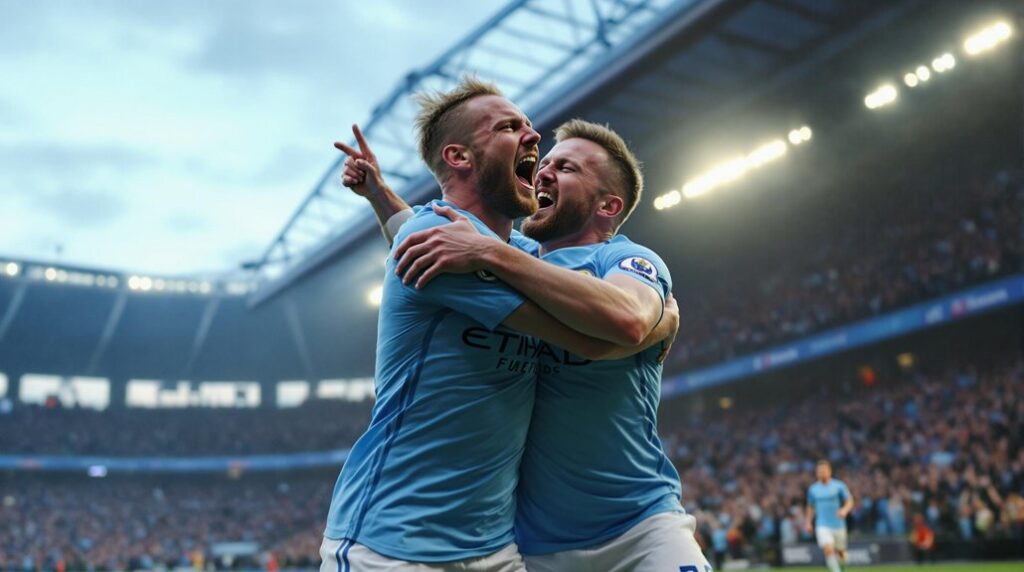The Abu Dhabi Takeover: A New Era Begins
On September 1, 2008, Manchester City underwent a transformative change when the Abu Dhabi United Group, led by Sheikh Mansour bin Zayed Al Nahyan, acquired the club from former Thai Prime Minister Thaksin Shinawatra for £210 million.
You'll find that this takeover marked the beginning of an unprecedented era in the club's history, as they've since invested over £1.5 billion in players, infrastructure, and community development. The club's immediate ambition became clear when they broke the British transfer record to sign Robinho from Real Madrid for £32.5 million on deadline day. Under Abu Dhabi's ownership, you've seen City transform from a mid-table team into one of Europe's powerhouses, building the state-of-the-art Etihad Campus and establishing a global network of football clubs under the City Football Group umbrella.
Building the City Football Group Empire
The Abu Dhabi United Group's vision extended far beyond Manchester City's immediate success, leading to the creation of the City Football Group (CFG) in 2013. You'll find that CFG's portfolio now includes clubs across multiple continents, from New York City FC to Melbourne City FC and Mumbai City FC. Through this network, they've established a global scouting system and player development pipeline that's revolutionized football operations.
You can see CFG's strategic approach in how they've standardized training methods, shared resources, and implemented similar playing styles across their clubs. They've also leveraged economies of scale in commercial operations, marketing, and technology. The group's expansion hasn't slowed, as they've continued to acquire stakes in clubs worldwide, creating what you'd recognize as one of football's most sophisticated multi-club ownership models.
Trophy Cabinet Transformation
Manchester City's trophy cabinet underwent a remarkable transformation following their 2008 takeover, marking a dramatic shift from decades of limited success to an era of unprecedented achievement. You'll find that since Sheikh Mansour's investment, City's domestic dominance has produced multiple Premier League titles, FA Cups, and League Cups, transforming the club into England's most formidable force.
You can trace this evolution through their first major breakthrough, the 2011 FA Cup victory, followed by the dramatic 2012 Premier League title secured by Sergio Aguero's last-minute goal. Since then, you've witnessed City's continued ascension, with the club securing numerous domestic trebles and finally claiming their first Champions League trophy in 2023, completing their transformation into a European powerhouse.
Youth Development and Infrastructure
Since establishing their state-of-the-art City Football Academy in 2014, Citizens have invested over £200 million in youth development facilities and infrastructure projects, creating one of Europe's most advanced training complexes.
You'll find 16 full-size training pitches, a 7,000-capacity academy stadium, and cutting-edge sports science facilities across the 80-acre campus. The academy's programs have produced talents like Phil Foden and Cole Palmer, while you can observe how the facility's sophisticated data analysis systems track player development. The complex includes dedicated areas for each age group, from U9s through to the first team, ensuring seamless progression through the ranks.
You'll notice how the facility's environmental sustainability features, including rainwater harvesting and solar panels, reflect the club's commitment to modern infrastructure development.
Financial Strategy and Commercial Growth
Through strategic financial management and innovative commercial partnerships, Citizens have transformed into one of football's most valuable brands, with revenues exceeding £613 million in 2022. You'll notice their diversified revenue streams include matchday income, broadcasting rights, and commercial deals with major global brands like Puma and Etihad Airways.
The club's financial strategy focuses on sustainable growth while complying with Financial Fair Play regulations. You can see this approach in their balanced spending on player transfers, infrastructure development, and global expansion initiatives. Their commercial growth extends beyond traditional revenue sources, as they've established the City Football Group, which owns stakes in clubs worldwide. This model has allowed them to create multiple revenue streams and expand their brand presence across key markets in Asia, North America, and Europe.
Community Impact and Local Legacy
Beyond their financial achievements, the club's impact resonates deeply within the Manchester community, where they've implemented numerous social initiatives and development programs. You'll find their City in the Community Foundation actively working across Greater Manchester, reaching over 30,000 participants annually through various educational and sporting initiatives. They've established multiple football schools, created job opportunities, and developed the Etihad Campus, which has transformed East Manchester's previously neglected industrial area. Through their "City Thrive" mental health program, you can see their commitment to supporting local youth and families. The club's investment in local infrastructure, including improved transportation links and community facilities, has helped regenerate surrounding neighborhoods, creating a lasting positive impact that extends far beyond match days.

